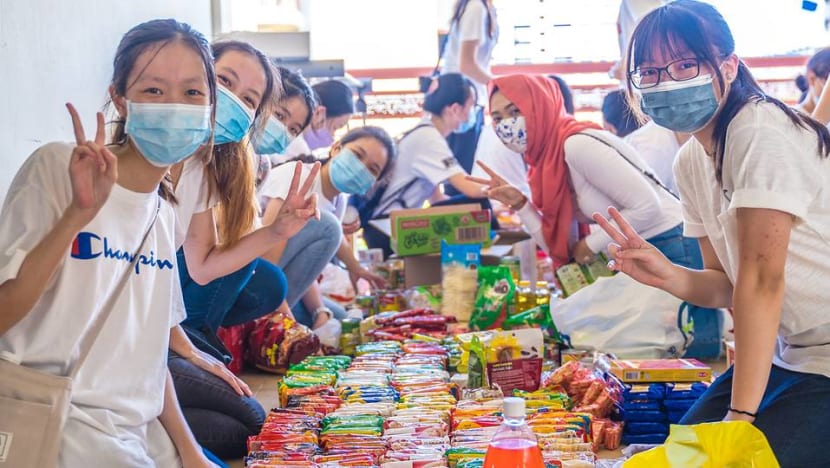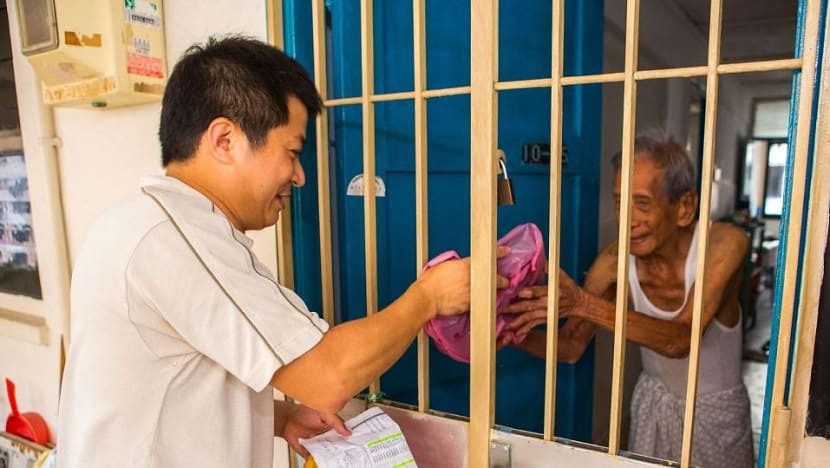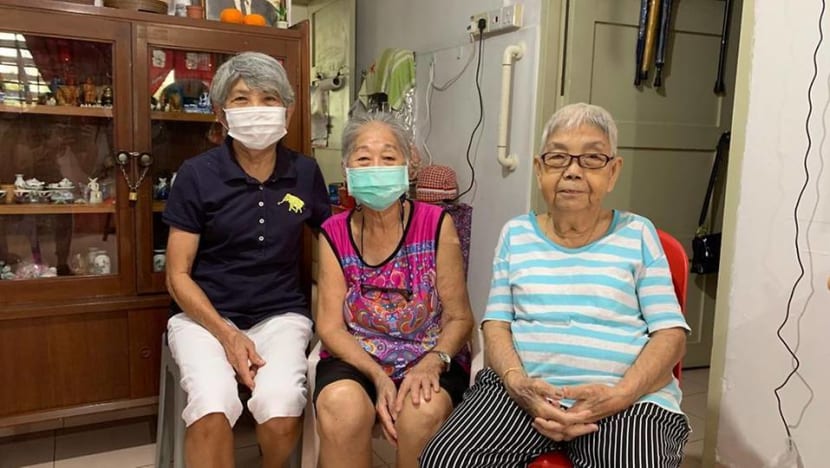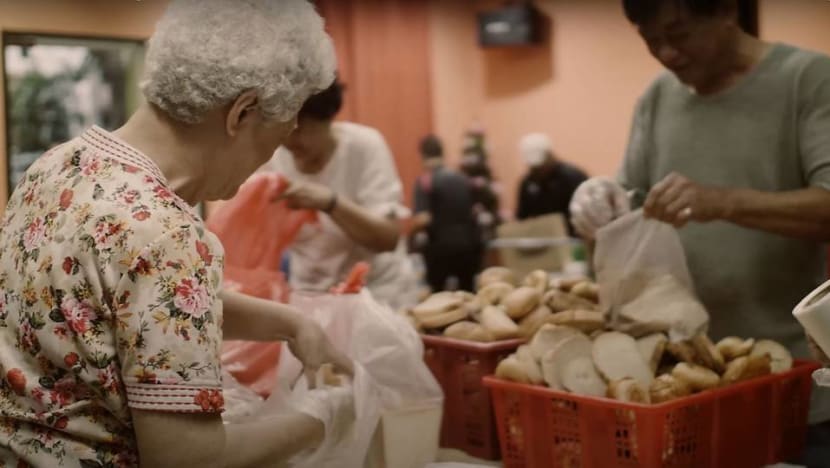Volunteers wanted: Charities face manpower crunch while beneficiaries increase

East Youths is a volunteer-run organisation that serves the elderly and youths from less privileged backgrounds. (File photo: East Youths)
SINGAPORE: Some charities are seeing dwindling pools of volunteers, whittled down by COVID-19 restrictions, even as the number of beneficiaries they serve continues to grow.
Organisations CNA spoke to said that their teams of volunteers shrank each time new public health measures against the pandemic were introduced.
For East Youths, a volunteer-run organisation that serves needy elderly and youth, the "circuit breaker" period last year led to a 70 per cent reduction in volunteers - and numbers never quite recovered after.
“Previously, per activity, we would have like 60 volunteers each. Now there are about 10,” said Ms Jishna Bole, the team’s marketing director. The team organises food distribution drives, elderly befriending and children’s education programmes.
READ: A 10-year-old girl raised over S$250,000 for charity online. This is how she did it
It did not help when Phase 2 (Heightened Alert) was introduced last month. “Every time there's a certain amount of closure, new sign-ups will always decrease,” said Ms Jishna.
Renewed fears over COVID-19 could be keeping people from signing up, she said, especially for the kind of volunteer activities they organise, which largely deal with in-person interactions.
The shrinking pool has become a vicious cycle, she added.
“Our current volunteers have quite a bit of stress because they are highly sought after.
"A big workload is placed on (them), leading to a lot of them not able to attend our future volunteering activities, causing a drop off on top of the current COVID-19 situation,” said Ms Jishna.
The problem is amplified by the growing number of beneficiaries who have been affected by the pandemic.

Meals-on-Wheels, an initiative under TOUCH Community Services’ umbrella, is seeing similar issues. Under the initiative, volunteers deliver meals to about 700 home-bound elderly residents twice a day, seven days a week.
After Phase 2 (Heightened Alert) kicked in, there was a 20 per cent drop in the number of volunteers, said Mr Victor Poh, who heads volunteer management at the social service agency.
He added that among those who dropped out were volunteers from schools and corporate groups, who preferred to suspend or cancel their involvement due to the tightened measures.
Having fewer helping hands could mean late meal deliveries for elderly households, Mr Poh noted.
READ: The Big Read: Despite personal setbacks, ordinary Singaporeans on a mission to spread cheer amid COVID-19 gloom
This is a challenge, especially as the initiative is serving more beneficiaries.
For instance, there has been a 10 per cent increase in residents – from 297 to 330 – being served in the western region, and more volunteers are needed there, said Mr Poh.
“Channelling internal (staff members) to fill this gap can only be a temporary arrangement as we still need to recruit more volunteers to tide us through this challenging period," he added.
MORE REGULAR VOLUNTEERS NEEDED
Other charities with more support said ad hoc volunteer numbers are sufficient, but they need more regular volunteers.
Lions Befrienders, a social service agency targeting the elderly, said it is “seriously short of” volunteers who can commit to helping out at least twice a week over at least six months.
“We need such (long-term) volunteers because seniors (we help) are humans who have been abandoned, neglected and or isolated.
"It is harder to regain their trust and build a relationship, such as breaking the ice and opening up to the volunteers quickly,” said chairman of Lions Befrienders Anthony Tay.
In addition, its longest-serving pool of about 10 volunteers – who have been caring for seniors for the past 26 years – are now in their 70s and set to retire this year, he noted.

And with about 50 of its volunteers above 70 years old, the organisation needs new blood, said Mr Tay.
Moving forward, the need for regular volunteers will only get more urgent with an ageing population.
The recent move by the Health Ministry to roll out new baseline services at eldercare centres nationwide has already put more seniors under the care of Lions Befrienders.
It now serves about 17,000 seniors, up from about 7,600 previously, noted Mr Tay.
He added that with the organisation’s 120 permanent staff members and floating pool of 20 interns and part-timers, volunteers are needed to beef up manpower.
“When there are too few volunteers, staff members have to take up the role of doing the non-core tasks, such as reading letters and bills for the seniors.
“If volunteers can take on such tasks for the staff, the staff can focus their time on the core services,” he added.
NOT JUST ABOUT THE NUMBERS
Having regular volunteers would also help ease operational challenges created by safe distancing measures, said the CEO of Food From the Heart Sim Bee Hia.
The organisation, which currently prepares 9,000 food packs a month, up from 6,000 before the pandemic hit, has split its volunteers to adhere to restrictions.

“We need a particular type of volunteer who can come in and commit (regularly) because this one person would fill up more sessions, and also minimise crisscrossing and minimise headcount coming in,” she said.
“Immediately my risk is down … if one person can commit to say, five mornings, or five afternoons, or (if) they can come in for the whole day.”
She added: “It is not just about the numbers … it’s the type of help we need.”
Ms Sim also emphasised that volunteer safety is a top priority, and that individuals are encouraged to cancel if they need to. This makes things more volatile, but it is a necessary measure, she stressed.
WHERE TO FIND VOLUNTEERS?
The organisations are hopeful that numbers will pick up again soon, now that some COVID-19 restrictions have been relaxed in Phase 3 (Heightened Alert).
Corporates returning to the fold would be a huge shot in the arm, said Ms Sim.
"For a corporate to say: 'I commit to three months to deliver 50 houses' - especially for big companies, they may not even use up 1 per cent of their staff strength. (With all their different teams), they can easily fill up a year. So that's what we're looking at - corporates who can commit long term."
WATCH: Charities say cashless giving has increased, is a useful way to retain donors
Ms Jishna from East Youths said the team is ramping up marketing efforts on different platforms, in the hopes of drawing a new crowd.
For instance, beyond using Instagram to target students, they have started using professional networking platform LinkedIn to reach working adults in their 20s to 30s.
For TOUCH Community Services, Mr Poh said that in the meantime, "sudden shortfalls" of volunteers will be plugged by their own staff members. He also expressed gratitude to individuals who are volunteering more frequently to help out.
As for Lions Befrienders, Mr Tay said their plans are to improve sign-ups and retention through "increased volunteer engagements, continual volunteer recruitments and proper recognition of volunteers’ efforts".














